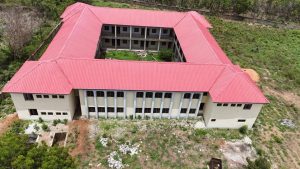Higher education is instrumental in fostering in growth, reducing poverty and boosting shared prosperity (World Bank, 2024). It benefits not just the individual, but the entire educational system.
The economic returns for higher education graduates are the highest in the entire educational system – an estimated 17% increase in earnings as compared with 10% for primary and 7% for secondary education. These high returns are even greater in Sub-Saharan Africa, at an estimated 21% increase in earning for tertiary education graduates
(World Bank, 2024).
Nigeria’s higher education system stands at a crossroads. On one hand, the country’s young and rapidly growing population faces a dire shortage of university spaces. On the other, existing universities are plagued by underfunding, overcrowding, and deteriorating infrastructure.
Recently, the Academic Staff Union of Universities (ASUU) called for a halt to the creation of new universities until these systemic issues are addressed. But do we really need more universities in Nigeria, or should the focus be on improving the existing ones? A closer look at the state of Nigeria’s higher education system, and examples like Kwara State University (KWASU) in Malete, can provide valuable insights.
The Higher Education Crisis in Nigeria
Nigeria, with a population exceeding 220 million people, faces a growing demand for university education. Each year, over 1.8 million students apply to universities through the Joint Admissions and Matriculation Board (JAMB), yet only about 600,000 gain admission (JAMB, 2022). This leaves a significant portion of qualified candidates without access to higher education. With more than 219 universities across federal, state, and private sectors (NUC, 2023), the capacity remains insufficient. Moreover, Nigeria’s tertiary enrolment rate is only 10%, far below global averages (UNESCO, 2021).
Despite the glaring need for expanded access, ASUU argues that creating new universities could exacerbate existing problems, including chronic underfunding and poor infrastructure in current institutions. The Nigerian public university system requires approximately N1.1 trillion for rehabilitation and to maintain basic standards (ASUU, 2022). Without addressing these issues, the expansion of universities could lead to further dilution of education quality.
Kwara State University, Malete: A Success Story
Kwara State University (KWASU), established in 2009, stands as a notable exception to the many challenges facing Nigeria’s universities. From its inception, KWASU has thrived under quality leadership and a focus on sustainability. Unlike many public universities that rely heavily on government subvention, KWASU has built a model of self-sufficiency. The university has developed income-generating initiatives, such as consultancies, entrepreneurial programs, and partnerships with private sector organizations. These efforts have allowed KWASU to remain relatively self-sustaining, even amid funding shortfalls from the government.
Leadership plays a pivotal role in KWASU’s success. Its commitment to transparency, accountability, and strategic planning has enabled the university to maintain high academic standards and deliver value to students. The university’s entrepreneurial focus prepares students not only for academic success but also for real-world challenges, making its graduates more employable and independent. This model of leadership and sustainability provides a blueprint that other Nigerian universities could follow.
Do We Need More Universities?
The debate over whether Nigeria needs more universities hinges on the balance between access and quality. On one side, the sheer demand for higher education necessitates an increase in the number of universities. With the North-East and other underserved regions of the country lacking sufficient university access, the establishment of new universities could provide opportunities for millions of young Nigerians to pursue higher education. Moreover, new universities, if strategically designed, could specialize in fields such as agriculture, technology, and healthcare, fostering innovation and supporting Nigeria’s economic diversification.
On the other hand, without addressing the fundamental issues of underfunding, poor infrastructure, and declining quality in existing universities, expanding the number of universities could spread already limited resources too thin. Many newly established state and private universities have struggled to remain viable, operating below capacity and failing to attract quality faculty or students. This highlights the need for a more deliberate approach to university expansion.
Recommendations: Learning from KWASU
If Nigeria is to expand its university system, it must do so thoughtfully and sustainably. Drawing lessons from Kwara State University, the following recommendations should be considered:
1. Focus on Leadership and Accountability: The success of any institution hinges on its leadership. Universities should prioritize appointing leaders with a strong vision for sustainability, accountability, and innovation. Just as KWASU has thrived under such leadership, other universities can replicate this success with the right governance structures in place.
2. Build Self-Sustaining Models: Rather than relying solely on government funding, universities should be encouraged to develop self-sustaining income streams. This could include entrepreneurial initiatives, research consultancies, and partnerships with the private sector. By doing so, universities can become less vulnerable to fluctuations in government budgets and more responsive to market demands.
3. Strengthen Existing Institutions Before Expansion: While the creation of new universities may be necessary to meet demand, the focus should first be on strengthening the capacity and quality of existing universities. Improving infrastructure, faculty development, and student welfare at current institutions will help ensure that new universities are not established at the expense of quality education.
4. Strategic Location and Specialization: Any new universities should be established in underserved regions and designed with a focus on specific areas critical to national development. Specialized institutions, such as technology hubs or agricultural universities, can address sector-specific challenges and improve Nigeria’s global competitiveness.
5. Public-Private Partnerships: Governments should explore partnerships with private sector organizations to fund and manage universities. This approach could reduce the financial burden on the government while improving educational outcomes through enhanced resources and expertise.
Nigeria undoubtedly needs more universities to meet the growing demand for higher education. However, the creation of new institutions should not come at the expense of quality or sustainability. The Kwara State University, Malete model demonstrates that with the right leadership, universities can become self-sustaining, accountable, and impactful. As Nigeria charts its path forward in higher education, it must prioritize improving existing universities while carefully expanding to meet future needs. By doing so, the nation can ensure that its youth have access to both quality and quantity in higher education, laying the foundation for a more prosperous future.
—- AbdulWaheed Onikanhun From: Ilorin aobello1020@gmail.com














1 Comment
Well penned. This article is very educative and witty.